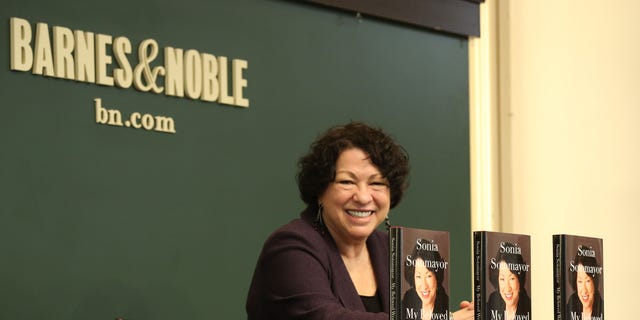
Sonia Sotomayor’s net worth has increased significantly since joining the nation’s highest court, according to financial disclosure forms amid new revelations about the Supreme Court justice’s efforts to promote her books.
Sotomayor was nominated by then-President Barack Obama to join the Supreme Court in 2009. At the time, her wealth was a small fraction of what it is now.
In 2007, the sum of Sotomayor’s total investments was between $50,001 and $115,000, according to her financial disclosure form for that year. She reported only two assets: a checking account and a savings account, both at Citibank.
In 2008, Sotomayor’s financial disclosures show she had the same two assets, this time totaling $15,001 to $65,000. The following year, during which Sotomayor was both nominated and confirmed to the Supreme Court, she held the same investments for the same range of value.
SOTOMAYOR DISSENT IN CHRISTIAN DESIGNER CASE MAKES FALSE CLAIM ABOUT PULSE NIGHTCLUB SHOOTING
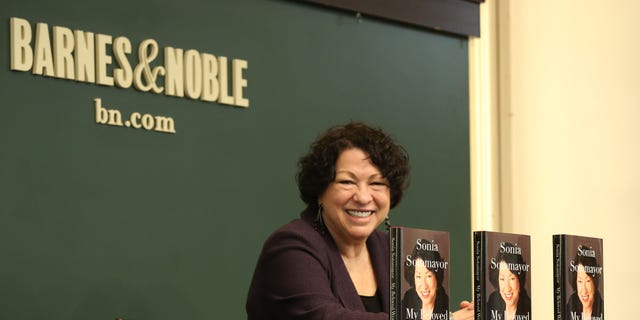
Supreme Court Justice Sonia Sotomayor promotes her new book “My Beloved World” at Barnes & Noble Union Square on Jan. 20, 2013 in New York City. (Rob Kim/Getty Images)
Since then, Sotomayor’s net worth has skyrocketed, putting her among the ranks of the nation’s millionaires. In 2021, her investments totaled somewhere between $1.5 million and $6.4 million, according to financial disclosure forms. Last year, investments were roughly the same, in between $1.6 million and $6.6 million.
Sotomayor’s yearly salary was about $180,000 as a federal appeals court judge before Obama nominated her, supplemented by about $25,000 a year from teaching at New York-area law schools. That salary went up several thousands of dollars upon becoming a Supreme Court justice.
Currently, members of the high court make $285,400 except for the chief justice, who earns just under $300,000.
One reason for the sharp increase in Sotomayor’s investments and overall wealth is the money she’s made from writing books. On Tuesday, the Associated Press reported that her staff has often “prodded” public institutions that have hosted the justice to buy her memoir or children’s books — works that have made her at least $3.7 million since joining the Supreme Court and continue to rake in six-figure royalty payments annually.
According to the AP, Sotomayor’s publisher, Penguin Random House, has played a role in organizing her talks, even pressing public institutions to commit to buying a certain number of copies or requesting attendees purchase books to obtain tickets.
Sotomayor didn’t recuse herself from multiple cases before the Supreme Court involving Random House, despite earning significant money from her book deal with the publisher.
SOTOMAYOR DIDN’T RECUSE HERSELF FROM RANDOM HOUSE CASES AFTER GETTING $3 MILLION FOR HER MEMOIR
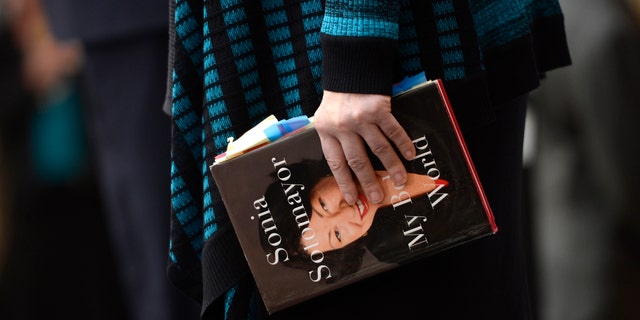
Supreme Court Justice Sonia Sotomayor holds a copy of her book as she visited with students during a celebration to dedicate the new Ralph L. Carr Colorado Judicial Center in Denver, May 2, 2013. (RJ Sangosti/The Denver Post via Getty Images)
“Justice Sotomayor is a good person who appears to have made a mistake by having her staff sell her books, including what appears as pressure on schools and libraries to buy a minimum number of her books before her speaking engagements,” Mike Davis, founder and president of the Article III Project, told Fox News Digital. “She acknowledges she made a mistake by failing to recuse from several cases involving her book publisher. The Supreme Court has adequate mechanisms in place to deal with these mistakes, and the Supreme Court has already taken corrective measures.”
Supreme Court Justice Neil Gorsuch also didn’t recuse himself from a case involving Random House, despite having his own lucrative book deal with the publisher.
Following the AP’s report, the Supreme Court defended Sotomayor in a lengthy statement, insisting there was no illicit activity and denying attendees of events featuring Sotomayor were ever required to purchase her books.
“Judges, including justices, routinely travel and speak to university, college and law school audiences and affiliated individuals and entities. Judicial staff play an important role in assisting on issues of ethics, travel, and security,” the statement read. “Chambers staff assist the justices in complying with judicial ethics guidance for such visits, including guidance relating to judges; publications. For example, judicial ethics guidance suggests that a judge may sign copies of his or her work, which may also be available for sale, but there should be no requirement or suggestion that attendees are required to purchase books in order to attend.”
Sotomayor isn’t alone in making good money from writing books. Multiple justices currently on the Supreme Court are earning high-dollar payments from book deals — Justice Amy Coney Barrett, for example, received a reported $2 million advance for a forthcoming book. Such activity is raising alarm bells among ethics experts who closely observe the high court.
“I’m very concerned about the books,” Richard Painter, a University of Minnesota law professor and former chief White House ethics lawyer, told Fox News Digital. “It’s problematic to the core.”
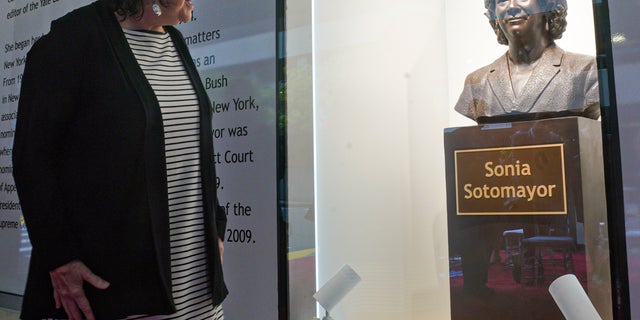
Supreme Court Associate Justice Sonia Sotomayor looks at a bronze bust of herself after it was unveiled at the Bronx Terminal Market on Sept. 8, 2022 in the Bronx borough of New York City. (Bebeto Matthews-Pool/Getty Images)
Painter explained that executive branch employees are prohibited from receiving income from royalties for books that have anything to do with their official position. A Treasury Department official, for example, can’t receive royalties for writing a book on bank regulations but potentially could for writing a book on collecting stamps.
Traditionally such restrictions may have not applied to the judiciary at least in part because they often wrote treatises on the law read primarily by academics rather than the public.
“For some reason we let the judges and justices do it,” said Painter. “I think that’s wrong. There’s just too much money in it, millions of dollars. We’ve got to know the difference between judges and cable news hosts.”
Painter argued that justices today have become “heroes for different political factions in our country,” noting they have “fan clubs” on the political left or political right that are going to be the ones buying their books. “It creates an enormous temptation to stay in that lane. If your opinion goes against your group, there goes your book sales.”
Another problem, he noted, is the fact that publishers responsible for book advances and contracts may have matters before the high court potentially requiring certain justices to recuse themselves.
Investments could pose a similar problem, he said.
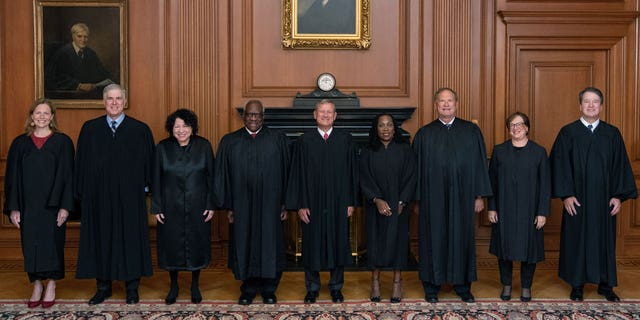
Members of the Supreme Court (L-R) Associate Justices Amy Coney Barrett, Neil M. Gorsuch, Sonia Sotomayor, and Clarence Thomas, Chief Justice John G. Roberts, Jr., and Associate Justices Ketanji Brown Jackson, Samuel A. Alito, Jr., Elena Kagan, and Brett M. Kavanaugh pose in the Justices Conference Room prior to the formal investiture ceremony of Associate Justice Ketanji Brown Jackson September 30, 2022 in Washington, D.C. (Collection of the Supreme Court of the United States via Getty Images)
“Justices should not be invested in individual stocks,” said Painter. “It presents big problems. “You have to recuse yourself if a case involves the company. And there are major problems with trying to sell the stock.”
He also noted the connection between book deals and investments, as more money from advancements and royalties could lead to more money being invested.
The AP’s story came out amid a flurry of media coverage from prominent outlets detailing the financials of and gifts received by Republican-appointed Supreme Court justices, especially Clarence Thomas. Many of these publications haven’t reported on Sotomayor’s royalties or broader increase in wealth.
“The media ignores Justice Sotomayor receiving gifts while attacking Justices Thomas and Alito,” tweeted Sen. Tom Cotton, R-Ark. “Once again, there is a different standard for conservatives.”
That point was echoed by Davis, who formerly served as chief counsel for nominations to Senate Judiciary Chairman Chuck Grassley, R-Iowa.
CLICK HERE TO GET THE FOX NEWS APP
“What is unmistakable is the deafening silence of so many Democrats and others on the left who have constantly attacked conservative Supreme Court justices — and for far less,” said Davis. “If Senate Democrats actually cared about ethics, they’d start by cleaning up the crack den called the Biden White House.”
Regardless of whether the justice is liberal or conservative, Painter called for bipartisan legislation to impose on the judiciary the same ethics rules that govern the executive branch, as well as for the creation of an inspector general for the Supreme Court.
The Supreme Court didn’t respond to a request for comment for this story.







